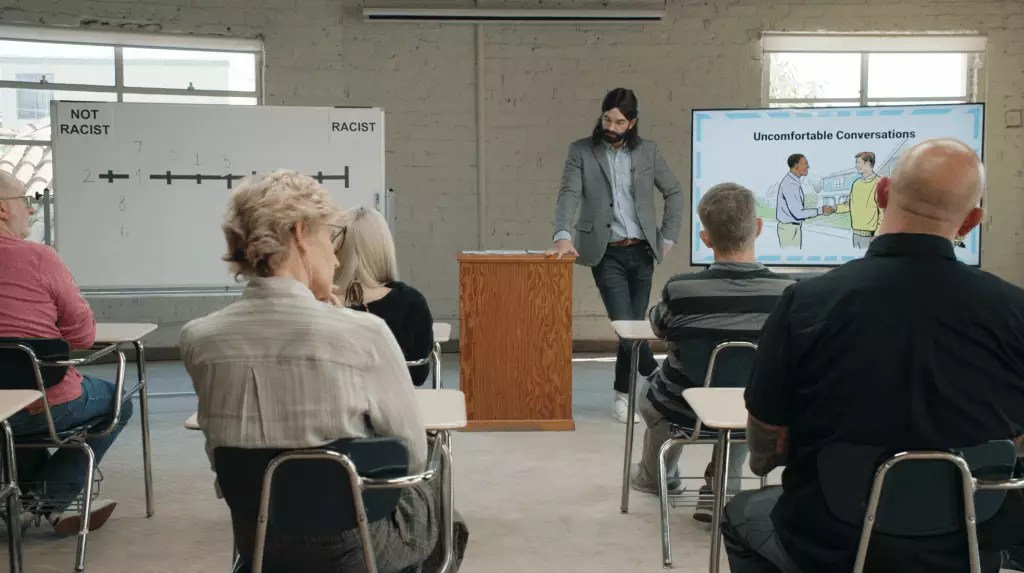The landscape of the domestic box office has recently seen a significant resurgence of films with conservative and faith-based narratives. In a weekend that reflected this shift, two films made impressive debuts: Jeremy Boreing and Ben Shapiro’s “Am I Racist?” and “God’s Not Dead: In God We Trust,” both of which underscore a growing audience appetite for content that aligns with conservative ideologies. This article delves into the details behind their successes and the emerging trends within this niche of the film industry.
“Am I Racist?”, the first theatrical release from The Daily Wire, marked a noteworthy entry in the documentary genre, securing the fourth spot at the domestic box office with a $4.75 million opening across 1,517 screens. The film, which sets out to challenge the mainstream views on diversity, equity, and inclusion (DEI), has stirred significant discourse due to its provocative premise and clever execution. Following Matt Walsh, the host of “The Matt Walsh Show”, as he dons a persona to explore the misguided aspects of DEI practices, the film has garnered attention for its unabashed critique of contemporary societal norms.
Interestingly, the film has resonated particularly well with a young audience, as evidenced by the demographic breakdown provided by distributor representatives. With 40% of the audience being under the age of 35 and a notable 56% of viewers identifying as male, the film’s reach stands as an indicator of how conservative content can attract a younger demographic often regarded as progressive in their ideological leanings. This is significant since it might suggest a potential ideological shift among younger audiences who are increasingly seeking alternative viewpoints in mainstream media.
The audience score of 99% on Rotten Tomatoes with over 500 ratings further underscores the film’s popularity among viewers, though the absence of a critics’ ranking illustrates the polarized nature of film criticism today. It serves to highlight how conservative films can fuel a dedicated fanbase that may feel underrepresented in a predominantly liberal Hollywood. The reported $4.75 million gross isn’t just a win for Boreing and Shapiro; it represents a broader movement of conservative filmmakers reclaiming a space in a market largely dominated by progressive narratives.
Moreover, “God’s Not Dead: In God We Trust” also showcased the financial viability of faith-based films, capturing the tenth position with $1.46 million across 1,392 screens. As the fifth installment in the “God’s Not Dead” series, the film starred David A.R. White as a reverend embroiled in a political struggle. Its foundational theme—that of faith’s role in governance—is one that appears to resonate strongly in a cultural climate where religion is often scrutinized. This growing trend of films that challenge the status quo of religious representation in media indicates a longing among specific audience groups for stories that align with their values.
Alongside these films, notable mentions include the anime “Dan Dan Dan: First Encounter,” which exhibites a different approach, having opened with over $1 million from 610 cinemas. This opening not only highlights the increasing interest in anime among domestic audiences but also sets a precedent for how animated series may engage with viewers in a theatrical setting. GKids’ decision to showcase the initial episodes in cinema ahead of a wider release aligns with a larger trend of event screenings that breed anticipation and community among fans.
The success of such anime showcases a market that is expanding beyond mere feature films, suggesting that diverse content, including animated series, can occupy a growing niche, likely extending to adults who are eager to consume quality storytelling through a different medium. Such developments indicate an evolution in viewing habits that could shape how films and shows are marketed in the future.
As the box office landscape expands to incorporate films like “Am I Racist?” and “God’s Not Dead: In God We Trust,” one must question whether this is a short-term trend or a sustainable shift in audience preferences. Filmmakers from both conservative and alternative sides of the spectrum appear poised to continue catering to these niches, especially as support from dedicated platforms like The Daily Wire lends credibility and financial backing to their endeavors.
The buzz generated by these films signals possible future integrations of unconventional narratives into popular film discourse, suggesting a more diverse and eclectic box office environment. As traditional boundaries in film are pushed, the demand for content that speaks to varied ideologies and backgrounds may pave the way for a more inclusive cinematic future—one where audiences can find representation across the ideological spectrum.


Leave a Reply